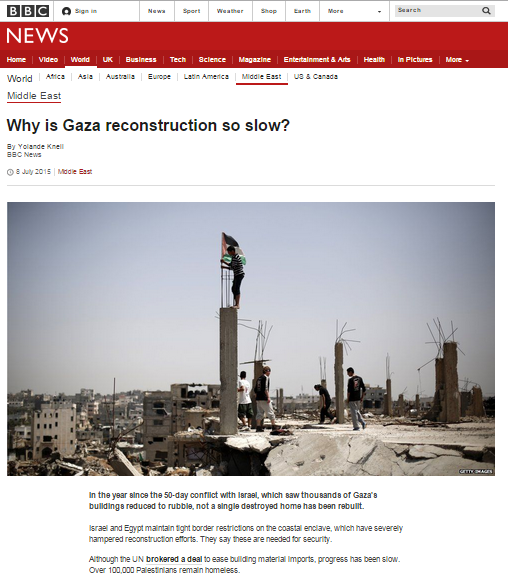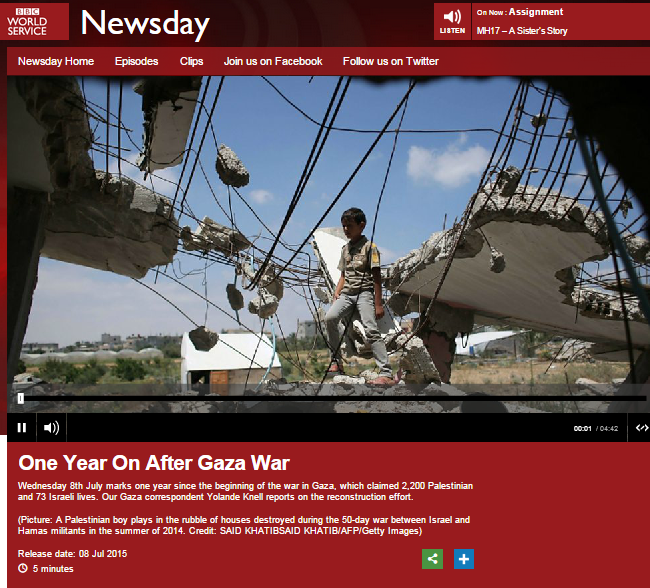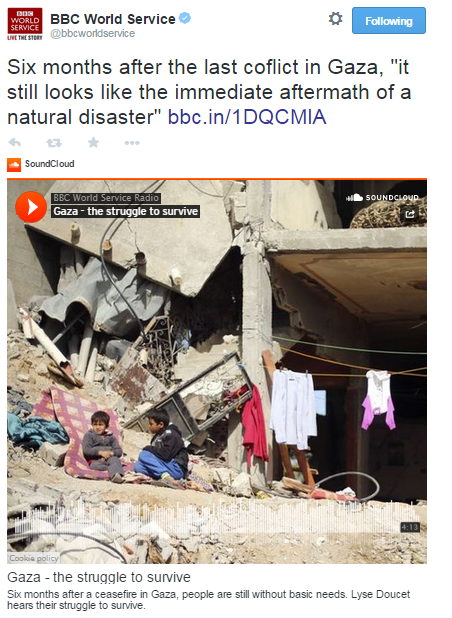Over the past year the BBC has devoted considerable multi-platform coverage to the topic of reconstruction in the Gaza Strip with the main recurrent theme being the shortage of construction materials. Time and time again the obviously relevant topic of the potential appropriation of construction materials for purposes of terrorism has been presented in the qualified terms of “Israel says” but no objective, serious reporting on that topic has been evident.
“Israel and Egypt maintain tight border restrictions on the coastal enclave, which have severely hampered reconstruction efforts. They say these are needed for security.” (BBC News website, 8/7/15)
“Israel tightly monitors the import of building materials and equipment into Gaza, arguing that militants could use them to rebuild tunnels and carry out attacks.” (BBC World Service, 8/12/14)
“Donors have pledged more than $5bn but Israel strictly regulates the import of building materials and equipment into the Palestinian territory. They say that militants could use the equipment to carry out attacks.” (BBC News website, 8/12/14)
“…but Israel bans the import of building materials for private use, saying that militants use them to build tunnels.” (BBC Radio 4, 18/9/14)
“The UN estimates that around 17 thousand houses were destroyed in the conflict. But, a blockade is in place stopping companies from importing building supplies. Israel says it fears that militants would use the materials to rebuild tunnels which could be used for renewed cross-border attacks by militant fighters.” (BBC television news, 5/9/14)
On at least one occasion, BBC audiences were told that Israel was not allowing construction materials into the Gaza Strip at all and anotherrecurring theme has been the claim that a lack of building materials – supposedly caused by border restrictions imposed by Israel – will bring about more conflict.
The Israeli Security Agency recently released information concerning the arrest last month of a Hamas operative from Rafah called Ibraheem Adel Shehadeh Shaer. Among the information provided by Shaer (also spelt Sha’ar) is this:
“Shaer told investigators that material for Hamas’s war infrastructure is now being brought into Gaza under the guise of reconstruction programs aimed at repairing the damage caused during the fighting, when thousands of buildings were destroyed.” [emphasis added]
Additional information revealed by Shaer includes:
“…a road recently built by Hamas along the border fence was intended for a surprise attack on Israel involving vehicles that would even cross the border. […]
Shaer also disclosed specific emergency procedures followed by Hamas and the organization’s intention of using tunnels rebuilt since last year’s Operation Protective Edge to launch attacks in Israel.
In particular, Shaer was able to supply the specific locations, paths, and digging sites of tunnels in the Rafah area leading in the direction of the Kerem Shalom border crossing. […]
Shaer said that Iran was sending money, advanced weapons and electronic equipment to the Gaza Strip including devices to disrupt radio frequencies meant to help down Israeli UAVs above the Gaza Strip. He also claimed that Iran had trained Hamas operatives in paragliding with the goal of infiltrating Israel.”
Will the BBC now stop using the qualifier “Israel says” and carry out some serious investigative reporting on this subject – not least the obvious failures of the UN administered ‘Gaza Reconstruction Mechanism’ which supposedly ensures that building materials are not misappropriated for the purposes of terrorism? Will the corporation finally recognize the significance of its long-standing self-conscription to the campaign promoted by UNRWA and Hamas to have all border restrictions lifted? And will the BBC finally clarify to its audiences that the precursor for future conflict lies in Hamas’ ongoing preparationsfor that scenario?
The fact that to date there has been no BBC reporting on this story does not inspire optimism on those fronts.
Hamas man spills beans on appropriation of construction materials: BBC silent








